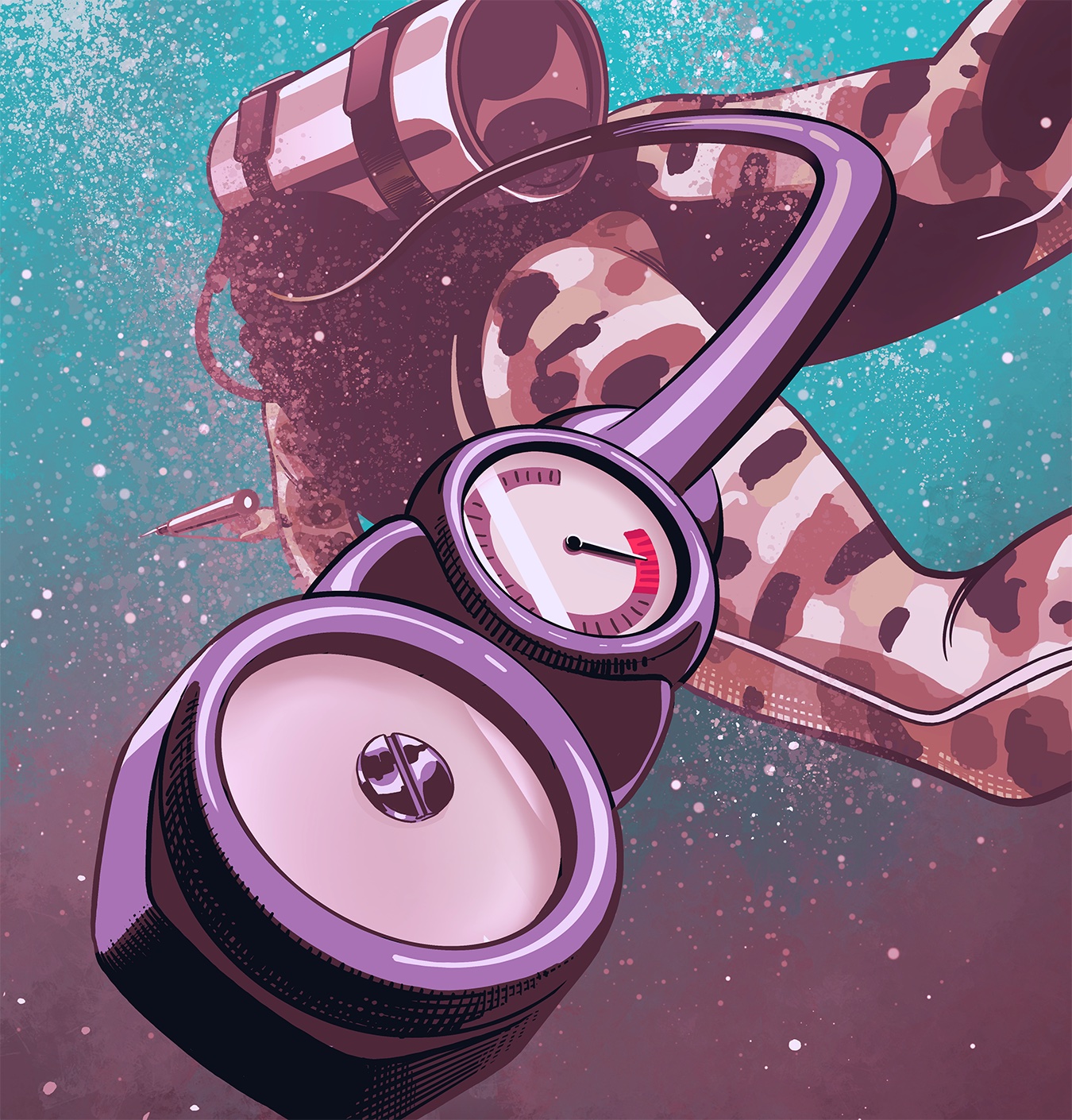Fishing for Trouble | Lessons for Life
Jeff and his buddy Ted were hoping to catch dinner while spearfishing off the coast. They were diving from Ted’s boat. Jeff hadn’t had any luck so far. He had taken one shot and missed. He hadn’t been able to get into position for another one after that. He felt like he had swum all over the reef. That’s when Jeff noticed it was getting harder to breathe.
The Diver
Jeff was a 43-year-old open-water certified diver and had been diving for more than 10 years. He never pursued advanced dive training after his initial open-water course. He wasn’t interested in broadening his dive knowledge and skill sets. For him, diving was about spearfishing and spending time in the water. It was just something he did.
The Dive
It was a warm summer day, and dive conditions were good. There was a light wind, but the ocean was mostly flat. Ted’s boat was a small runabout that they often used when they went out spearfishing together—just the two of them. They tied the boat to a buoy and dived until they ran low on air before surfacing with their catch. The reef they were exploring was about 80 feet deep. Like fishing anywhere, some days were better than others. Jeff’s buddy had speared one fish, but Jeff hadn’t gotten anything. Near the end of the dive, Jeff got Ted’s attention and signaled that he was going to return to the boat. Ted signaled back that he was going to chase a fish and would meet Jeff on the surface. The two divers moved off in different directions.
The Accident
A few moments later, Jeff returned, signaling frantically that he was out of air. Ted reported that Jeff grabbed for the regulator in Ted’s mouth. Ted attempted to give Jeff his octopus, but Jeff wouldn’t take it and continued struggling for Ted’s primary.
Ted pulled away from Jeff and ascended to the surface. He hoped Jeff would follow him. When Jeff didn’t reach the surface, Ted immediately called the authorities and stayed on the scene until help arrived. Rescue divers recovered Jeff from the bottom, not far away, with an empty tank. He had drowned.
Analysis
It can be easy to become distracted by a task during a dive and forget to monitor your air supply. That is just one reason having a buddy close by in the water is so important. Jeff was so focused on catching a fish that he neglected to monitor his pressure gauge and ran out of air before he could safely ascend to the surface. The two divers were probably only staying in general contact with each other as they hunted, making it harder for them to remind each other to check their air supply and stay out of trouble. This scenario can play out for any diver who has a secondary task while diving. If you’re spearfishing or photographing during a dive, it is important to pay attention to your surroundings, keep track of the boat and monitor your air supply—or have a dive buddy who will do that for you while you are completing your task.
Jeff was a certified diver, but he had never continued his training or thought to brush up on any of his emergency and self-rescue skills. One basic skill all divers learn is what to do in the event of an out-of-air emergency. Ted attempted to give Jeff his alternate air source, but at that point Jeff was so panicked and focused on his lack of air that all he could see was the working regulator in Ted’s mouth.
Jeff tried to take Ted’s primary regulator out of his mouth, potentially putting Ted in danger in the process. Although switching to an alternate air source is not a difficult skill, it does require periodic practice to ensure the skill stays fresh and that it can be carried out safely and reliably under stress.
If the two divers as a team had practiced air-sharing at the end of their normal dives, as well as other skills such as mask and regulator recovery, while doing a safety stop for example, they would have been better prepared to deal with an emergency when it happened.
Jeff had technically been diving for 10 years, but doing the same dive over and over does not mean you have 10 years of experience. It means you have one year of experience repeated 10 times. There is no problem with this, except that being 10 years removed from your initial training with no refresher or practice time put in can put you in jeopardy. Lastly, as with most dive accidents, panic played a role. Jeff ran out of air, and instead of making a safe ascent to the surface, he swam back to Ted looking for help. We don’t know what went through his mind at that point, but it is obvious he wasn’t thinking clearly or remembering his training. The second-best way to avoid panic in these situations is to practice emergency skills so they become second-nature. The first is to monitor your air throughout your dive so that you never run out or get yourself in trouble in the first place.
Lessons For Life
Choose a buddy who has compatible goals. If one of you is going to be focused on a task—like spearfishing or photography—it is a good idea to have the other diver watching out for both of you. You can switch out, so everyone gets a fair chance to do what they love underwater. Practice emergency skills. Spend a few minutes at the end of a dive to practice sharing air. It will pay dividends should you need it. Keep up to date. Diving is a skill, using life-support equipment. Don’t take it for granted. Keep up to date with articles in magazines, or take additional training from time to time to brush up on skills.
When you subscribe to the blog, we will send you an e-mail when there are new updates on the site so you wouldn't miss them.
